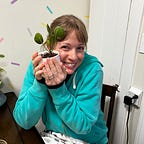The #1 habit I have learned from people with ADHD
I love the ADHD brain. It’s a fascinating tangle of miniature rabbit holes, punctuated by gaping deep dives, sprinkled with an astonishing mix of assorted trivia. An ADHD conversation is like a joy-ride in a Corvette with unpredictable steering functionality and an open track. Awesome in some contexts, but not in others. Many people with ADHD have to learn to steer the car, or, in other words, find strategies to manage their minds and accompanying behaviors.
There are millions of articles, videos and podcasts out there for people, offering great support and timely strategies to manage their symptoms. I have read hundreds of them. I’m classically neurotypical-ish, but I live with someone who has been diagnosed with ADHD, and I work as a coach with people who have it. The resources I’ve found provide excellent tools, many of which I use to support my own clients and loved ones. That being said, I think there’s also a lot to be learned from people with ADHD.
I’d like to offer a habit I have learned from my partner and others who have ADHD. It boils down to one phrase, that, when used responsibly, is life-changing.
“It can wait.”
When I first encountered this mindset, notably in people with ADHD, it was infuriating. Avoidance of and trouble with task initiation are classic symptoms of ADHD. And, in my world, another person putting off a task means that others, i.e. me, have to pick up the slack.
If there was a medal for picking up slack, I’d have it: I’m a responsible oldest child with a perfectionist streak. I do chores so often that my husband honestly thought I liked them. So, at the end of the day, him or anyone else putting off an unpleasant task has felt unfair and selfish.
But then I began to experiment with the mindset of putting things off myself. Here’s how the experiment went:
First, I began to take note of the times I felt a task needed to be done, and to ask myself: “Is this something you like or don’t like to do?” I then began to ask myself, “What will happen if I don’t do this right away?” For many of the things I thought were urgent, I was surprised to find the answer was, “Nothing. Nothing will happen.” I then began to think about when I could do the task, finding a time that was easier for me. I also began to learn that I did not have to do all the work I usually do — in pausing, I realized I could ask others at times to help. I work hard, often too hard, and need advocate for myself more.
Pausing to think before I do unpleasant things has changed my life. I have learned from observation of my partner and others who have ADHD that not doing a thing right away is not always the end of the world. Certainly, there is a point where you can go too far. Sometimes, something dire does happen if you avoid difficult work. But, putting it off doesn’t always mean it won’t happen. In fact, for many of us perfectionist over-achievers, a little mindful task avoidance is a healthy habit.
The key, whether ADHD or not, is simply this: to be mindful of what we avoid and why, and having confidence to ask those in our world for help. In my experience, it reduces the resentment on one side, and increases the sense of being needed and valued on the other. This kind of task-awareness allows us all more time to enjoy the mental joy-ride of rabbit holes and deep dives of our lives.
It certainly has in mine.
